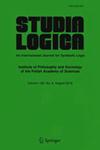布尔连接逻辑和内容关系
IF 0.6
3区 数学
Q2 LOGIC
引用次数: 0
摘要
我们在这里提出了一些布尔连接逻辑(bcl),它们旨在成为选定的爱泼斯坦内容关系逻辑(CRLs)的连接对等体。分析这种逻辑的主要动机是通过内容关系的概念来解释连接性的概念。本文由两部分组成。在第一部分中,我们着重于用公理系统进行句法分析。我们的语法考虑的起点将是最小的BCL和最小的CRL。在第一部分中,我们还识别了爱泼斯坦逻辑中的公理,这些公理与连接原则一起导致矛盾。此外,我们提出了一些原则,这些原则将等同于连接论点,但不等同于我们将提出的内容连接论点。在第二部分中,我们重点讨论了相关分配模型和集合分配模型提供的语义分析。我们为所有测试系统定义了健全和完整的相关语义。我们还指出了最小BCL的替代相关模型,这些模型不是所考虑的crl的连接对应物的替代模型。我们为一些bcl提供了集合赋值语义,从而给出了内容关系的自然形式化,可以理解为内容共享或内容包含。本文章由计算机程序翻译,如有差异,请以英文原文为准。
Boolean Connexive Logic and Content Relationship
Abstract We present here some Boolean connexive logics (BCLs) that are intended to be connexive counterparts of selected Epstein’s content relationship logics (CRLs). The main motivation for analyzing such logics is to explain the notion of connexivity by means of the notion of content relationship. The article consists of two parts. In the first one, we focus on the syntactic analysis by means of axiomatic systems. The starting point for our syntactic considerations will be the smallest BCL and the smallest CRL. In the first part, we also identify axioms of Epstein’s logics that, together with the connexive principles, lead to contradiction. Moreover, we present some principles that will be equivalent to the connexive theses, but not to the content connexive theses we will propose. In the second part, we focus on the semantic analysis provided by relating- and set-assignment models. We define sound and complete relating semantics for all tested systems. We also indicate alternative relating models for the smallest BCL, which are not alternative models of the connexive counterparts of the considered CRLs. We provide a set-assignment semantics for some BCLs, giving thus a natural formalization of the content relationship understood either as content sharing or as content inclusion.
求助全文
通过发布文献求助,成功后即可免费获取论文全文。
去求助
来源期刊

Studia Logica
MATHEMATICS-LOGIC
CiteScore
1.70
自引率
14.30%
发文量
43
审稿时长
6-12 weeks
期刊介绍:
The leading idea of Lvov-Warsaw School of Logic, Philosophy and Mathematics was to investigate philosophical problems by means of rigorous methods of mathematics. Evidence of the great success the School experienced is the fact that it has become generally recognized as Polish Style Logic. Today Polish Style Logic is no longer exclusively a Polish speciality. It is represented by numerous logicians, mathematicians and philosophers from research centers all over the world.
 求助内容:
求助内容: 应助结果提醒方式:
应助结果提醒方式:


